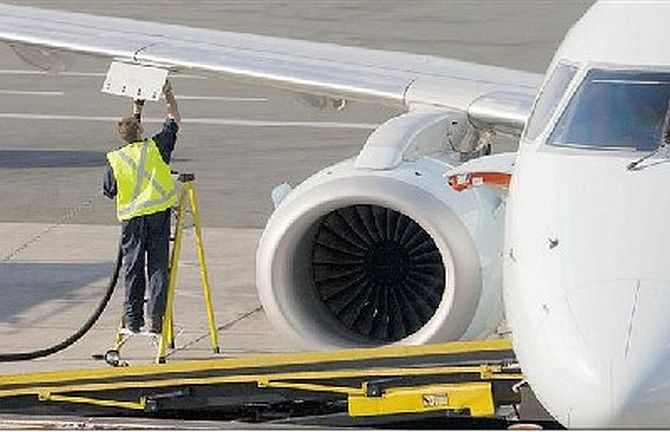Airfares have nearly doubled in a matter of days on routes hit by the cancellation of 200 weekly flights linking Mumbai airport to 12 cities.

The fares have soared as high as 193 per cent following a recent government order to cancel flights to ease “persistent congestion” that was causing delays.
Aside from the reduction in flights on 12 routes, two destinations — Hubli and Jabalpur — have lost connectivity with Mumbai since last week, according to aviation analytics firm Cirium’s data reviewed by Business Standard.
IndiGo had been operating Mumbai-Hubli and Mumbai-Jabalpur flights until last week.
IndiGo, India’s largest carrier, has been the worst affected by the congestion-induced cancellations.
Over the past week alone, it has cancelled 110 flights on nine routes connecting Mumbai.
This week, it is operating 2,451 flights to and from Mumbai.
Flights from Mumbai have been reduced to 12 destinations — Bengaluru, Chennai, Thiruvananthapuram, Hyderabad, Aurangabad, Goa, Kolkata, Mangaluru, Tiruchirappalli, Durgapur, Kannur, and Darbhanga.
The Mumbai airport, which was handling a total of 6,417 flights per week until last week, is handling 6,217 flights per week right now, according to the data.
On February 14, the Ministry of Civil Aviation said that it was compelled to intervene and order the reduction of flights because Mumbai International Airport Limited (MIAL), the airport operator, had not taken necessary action to alleviate “persistent congestion”, resulting in flight delays of up to 60 minutes.
The Mumbai-Kannur route has been the worst affected, with the number of flights halving to six services per week.
The average airfare for travel between March 18 and 22 has surged by 193.2 per cent to Rs 14,332 when tickets were booked for February 12-14 compared to the February 19-21 period, according to travel website Ixigo’s data.
This decrease in the number of flights was initiated by Indian carriers starting from around February 15 following the government’s directive.
None of the major airlines — Air India, AIX Connect, Vistara, IndiGo, SpiceJet, and Akasa Air — responded to queries from Business Standard.
The Adani Group-run MIAL also did not respond to questions.
The Mumbai-Darbhanga route has also seen a significant cut in its number of services, dropping to six flights per week now from 14 last week.
As a result, the average airfare between March 18 and 22 has increased by 30.9 per cent to Rs 8,911, when comparing prices of tickets booked for February 12-14 to those booked for February 19-21.
Three Tata Group-run airlines — Vistara, Air India, and AIX Connect — have cancelled 52, 25, and 13 flights per week, respectively.
Moreover, Air India has not operated flights on the Mumbai-Aurangabad route since last week.
Akasa Air and SpiceJet have cancelled 14 and two services per week, respectively, in the past week.
On February 14, the civil aviation ministry said: “While Mumbai airport is running at its full capacity, it was found that the persistent congestion was caused due to (i) excessive slot distribution with limited time margins on behalf of the airport operator, (ii) non-adherence of the slots on behalf of the airlines, and (iii) non-scheduled operations during peak hours.
"The airport operator (MIAL), being the slot provider as well as the manager of slots to the airlines, should have proactively taken steps to streamline and regulate air traffic movements, to resolve this problem.
"However, since no such action was initiated by them, the ministry of civil aviation has had to step in.”
“This action has been taken in larger public interest from the perspective of airspace safety, efficiency of operations and passenger satisfaction,” the ministry noted.











 © 2025
© 2025